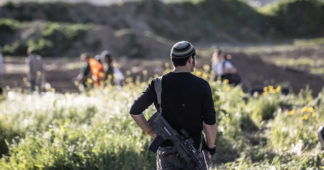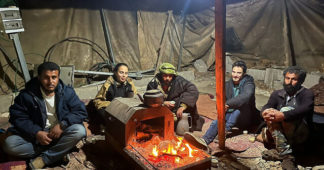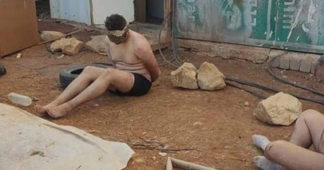The military order removes the last legal barriers to the wholesale demolition and displacement of 12 Palestinian villages in the southern West Bank.
Last week, the Civil Administration’s Central Planning Bureau — the Israeli military body responsible for issuing construction permits in the occupied Palestinian territories — adopted a policy requiring that all pending Palestinian building requests in Masafer Yatta be automatically rejected. The directive cites military needs as justification and specifically references Firing Zone 918, the area that encompasses 12 of Masafer Yatta’s 20 villages, and which Israel declared as a closed military zone in the early 1980s in order to forcibly displace its Palestinian residents.
The directive is based on a document issued last week by the army’s Central Command, which +972 and Local Call have obtained a copy of. According to the document, the residents of the area must be expelled “using the full range of civilian and security tools at [the army’s] disposal,” so that the army can practice live fire on their land “for the benefit of war in the various arenas — a war that has unfortunately become routine in the past year and a half and culminated in the events of Operation Rising Lions,” the Israeli name for the operation in Iran. Yehuda Alkalai, the head of the Central Planning Bureau, subsequently directed staff to align all decisions with this order.
The new directive builds on Israel’s long-standing use of military firing zones as a pretext for land dispossession and settlement expansion. While Palestinians previously could submit building plans that at least temporarily froze demolition orders during review, a 2021 military regulation first blocked processing of such requests without “military commander approval.” The new directive now targets dozens of pending applications submitted before this change.
Legal representatives for the Palestinian residents warn this removes any meaningful review process, and allows for mass, swift rejections without addressing individual cases or legal arguments. Alon Cohen Lifshitz, an architect working with Israeli planning rights NGO Bimkom, told +972 and Local Call that the building plans served as residents’ last protection, and the new policy “creates an infrastructure for emptying the firing zone entirely.”
Now, according to Masafer Yatta Council head Nidal Yunis, at least 25 pending building plans across multiple villages — including Jinba, Halawah and Al-Fakhit — may be rejected imminently, which would potentially trigger widespread demolitions.
Yunis explained that in recent years, the army focused on denying Palestinian building requests — as opposed to mandating the wholesale expulsion of Palestinian residents — as a way to mitigate international criticism. “They didn’t want the world to see that they’re carrying out ethnic cleansing, so they didn’t do big expulsions, with people being loaded onto trucks,” he told +972 and Local Call. “They’ve been trying to wear us down gradually, preventing us from working, demolishing homes, in the hope that people will become fed up and leave.”
Now, however, wholesale expulsion has become a very realistic prospect. According to Yunis, the Palestinian residents’ lawyers were struck by the military’s explicit language in its internal document, specifically the assertion that current security conditions allow for the army to transform the firing zone into a “sterile area” by “evacuating” residents.
For residents like 28-year-old Ahmad Muhammad Awad, the consequences of the directive would be immediate and devastating. “If they demolish our village, we’ll have to return to caves too small for our families, with inadequate living conditions,” he told +972 and Local Call. His community’s building request goes before the planning council next month.
“They claim this is land for military training, but in fact settlers control it. This year, they’ve been grazing on our fields more than ever before, destroying hundreds of dunams of our crops.”
‘They simply oppose Palestinian existence’
The move to accelerate demolitions aligns with Finance Minister Bezalel Smotrich’s broader annexation agenda. The far-right lawmaker, who was handed de-facto control of the Civil Administration by Netanyahu in 2022, has consolidated control over West Bank construction policies by installing allies in key positions — openly stating that his goal is to “deepen the settlement project across the Land of Israel, and prevent the establishment of a [Palestinian] terror state.”
But while Israel’s political echelon openly pursues settlement expansion, the military maintains the fiction of “training needs” to justify expulsions like those in Masafer Yatta. According to Neta Amar-Schiff, an attorney who represents some of the residents, the military justification short-circuits legal challenges in court. “[The army’s lawyers] rely on one exclusive argument, which is supposedly security-related,” she explained. “When you say ‘military commander,’ it closes the case immediately.”
In practice, however, research by Israeli NGO Kerem Navot shows that while the military declared around 1 million dunams — one-fifth of the West Bank — as firing zones, 80 percent of that territory remains unused for military purposes.
Meanwhile, on the ground, Israel’s bureaucratic assault coincides with escalating settler violence. After the Khilet Al-Dabe’ demolitions, settlers immediately established an outpost on the ruins of the community, harassing remaining families and looting their possessions. While protests by Israeli and international activists forced the settlers to withdraw, they have since tried to return.
Elsewhere in Masafer Yatta, settler attacks have continued unabated. On June 19, Israeli soldiers — who may have been settlers in army uniform — threw tear gas canisters at Palestinian shepherds in Jinba. The next day, a group of settlers were documented attacking families near the village of Susiya, leaving six Palestinians hospitalized. On the same day, a settler placed sheep carcasses near the homes of residents of Umm Qusa, in what residents describe as a psychological tactic to facilitate their expulsion.
Earlier that same week, Imran Nawaj’ah was also assaulted by settlers in Susiya, leaving him hospitalized. Nawaj’ah told +972 and Local Call that he was sitting with his wife and friends when he saw an ATV with five masked settlers, armed with clubs, approaching the village.
“They stopped and, without saying a word, began hitting me on the head,” he recounted. “I lost consciousness. When I came to, I saw that the settlers had run away. My wife was screaming because my head was bleeding. I was taken to hospital, unable to move or talk. I ended up needing 17 stitches.”
Yunis, the head of the local council, said communities in the area now effectively live under siege. “People are afraid to leave their homes,” he explained. “The demolitions and attacks come almost daily — they simply oppose [any] Palestinian existence in this area.”
As the planning council prepares to rule on pending applications in the coming weeks, residents face the grim reality that they and their homes may be next. With legal channels closing and settler violence intensifying, Israel’s dual strategy of bureaucratic and physical erasure appears poised to complete what it began decades ago: the total clearance of Masafer Yatta’s Palestinian communities.
In response to +972’s inquiry about the new directive, an Israeli military spokesperson stated that the Civil Administration and Central Planning Bureau “hold ongoing discussions regarding villages constructed within Firing Zone 918.” The spokesperson claimed the army has an “essential need for this area” and therefore no construction permits will be approved there, adding that the Civil Administration’s enforcement unit “acts to prevent any illegal construction, based on operational assessments, political directives, and applicable laws in the area.”
Contrary to these claims, historical records and residents attest that Palestinian villages in Firing Zone 918 predate the military’s designation of the area in the 1980s; many of them even predate the state. Moreover, while the army cites strict enforcement against “illegal construction,” Israeli settlers have established multiple outposts on the same land without facing demolition or legal consequences. Under the Fourth Geneva Convention, the forced transfer of a population living under occupation is strictly prohibited in all circumstances.
A version of this article was first published in Hebrew on Local Call. Read it here.
We remind our readers that publication of articles on our site does not mean that we agree with what is written. Our policy is to publish anything which we consider of interest, so as to assist our readers in forming their opinions. Sometimes we even publish articles with which we totally disagree, since we believe it is important for our readers to be informed on as wide a spectrum of views as possible.











